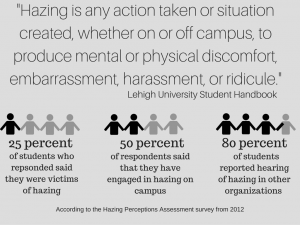Lehigh’s Hazing Prevention Coalition recently released an anti-hazing statement regarding the university community’s position on the practice of hazing on campus and to make it known that hazing is unacceptable and against university policy.
The statement reads: “Whatever the motivation or the justification, this much is clear: Hazing is antithetical to the values of our university, an insult to the dignity of individuals. It is also a path to extinction for groups that cannot or will not cease this behavior. Hazing is unacceptable and we must alter the culture which allows it to persist.”
Justin White, ’17, a student member of the coalition, said the main objective of the statement was to develop a clear description of hazing and how it spans a variety of Lehigh students’ experiences, whether in Greek life, athletics or other student organizations.
The coalition, which is made up of administrators and four students, has been meeting regularly throughout the school year to revamp Lehigh’s previous anti-hazing statement and address hazing on campus.
According to data collected by Bloomberg News sources, more than 60 people have died as a result of fraternity-related hazing since 2005.
“We look at what other universities have done, and we say, ‘Has what they’ve done worked?’ Is there anything we can take from that, can we make it more specific for our college,” coalition member Rob Hillman, ’17, said. “We look at universities that have really strong anti-hazing statements, and we try to match that level they’re at to try and make Lehigh better.”
The statement also references data from a survey conducted on Lehigh’s campus. The coalition conducted a Hazing Perceptions Assessment survey in the spring of 2012 to perceive how Lehigh students understand and relate to hazing. Approximately 62 percent of students who responded said that they have witnessed hazing.
One fourth of the students responded that they were victims of hazing, and almost 50 percent of respondents said that they have engaged in hazing on campus. Eighty percent of the Lehigh students who responded to the survey reported hearing of other organizations on campus that have been involved in hazing.
The practice of hazing is not limited to college campuses. A 2008 national survey revealed that nearly 50 percent of college students have been a victim of hazing while in high school. This learned behavior can influence their actions once they arrive at college, according to the statement.
Lehigh has adopted a proactive approach and has made several steps to eliminate hazing on campus by joining the National Hazing Consortium, hosting the 2011 Novak Institute on Hazing Prevention, creating the University Hazing Prevention Coalition and drafting the hazing prevention statement.
“I hope that it makes people know that this is a problem, not just at Lehigh, but all over many colleges, many universities, and that the university is trying to make it more accessible to report, to learn about it and to notice it in your everyday life,” Hillman said.
Hillman hopes that the combination of the coalition’s hazing prevention statement and the new website designed to inform and make the reporting of hazing easier will change students perceptions of hazing.
“I think if anything, having that access is going to change people’s reaction to hazing because now if they know about it, they know they can report (hazing),” he said. “So if they see it, instead of keeping it to themselves they finally know, ‘I can go here. I can do something about this.'”
The website will inform about hazing and make reporting it easier, and the coalition hopes to implement teaching seminars to educate students on campus as early as the end of the Fall 2015 semester or beginning of the Spring 2016 semester.
Hillman encourages students to get involved with the prevention of hazing on campus — to look for emails from the coalition about teaching seminars, visit the new website to learn about hazing or to speak with the administration to learn about what students can do.






Comment policy
Comments posted to The Brown and White website are reviewed by a moderator before being approved. Incendiary speech or harassing language, including comments targeted at individuals, may be deemed unacceptable and not published. Spam and other soliciting will also be declined.
The Brown and White also reserves the right to not publish entirely anonymous comments.
1 Comment
If they know of hazing and hazers, find ’em and expell ’em. “Eighty percent of the Lehigh students” know somebody else hazes – that’s heresay.